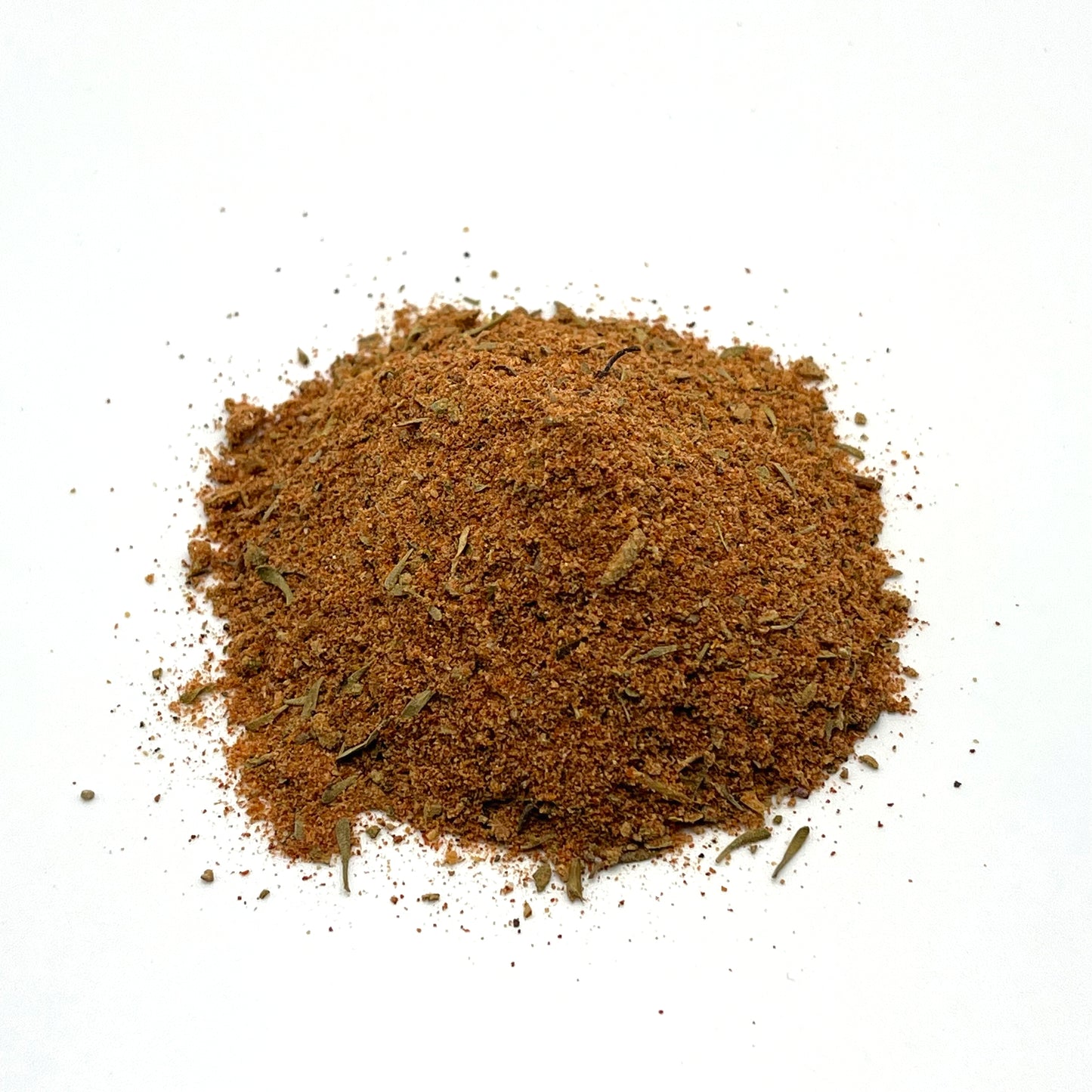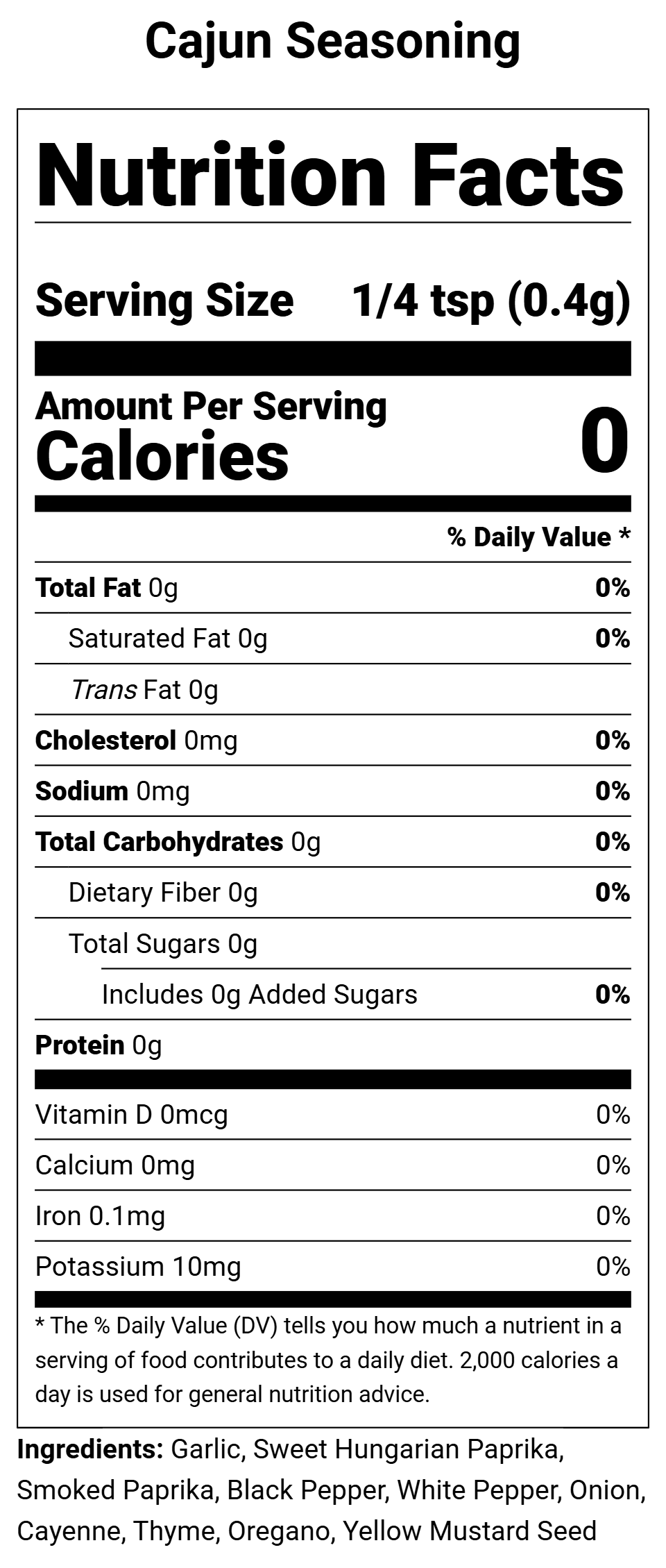Tasmanian Spice Traders
Cajun Seasoning
Cajun Seasoning
Couldn't load pickup availability
Ingredients
Ingredients
Garlic, Sweet Hungarian Paprika, Smoked Paprika, Black Pepper, White Pepper, Onion, Cayenne, Thyme, Oregano, Yellow Mustard Seed
Use With
Use With
Beef, chicken, pork, fish, seafood, eggs, rice, and vegetables
Suggested Uses
Suggested Uses
Use to make authentic Cajun gumbo and jambalaya, red beans and rice, seafood boils, boudin balls, and much, much more…
- Use as a dry rub for meats, poultry, and fish before roasting smoking, or grilling
- Add to sauces or marinades for a Louisiana kick
- Use to season the water for a good ol' seafood boil
- Mix with ground meat for incredibly delicious Cajun burgers, meatballs, or meatloaf
- Mix with olive oil and brush over fish, seafood, or chicken wings before roasting or grilling
- Use in soups and stews for extraordinary Louisiana flavor
- Sprinkle over popcorn, french fries, roasted corn-on-the-cob, deviled eggs, or salads
- Mix into cream cheese, ranch dressing, yogurt, or hummus for an easy, zesty dip or spread
- Endlessly versatile, shake it on just about anything you would normally use salt and pepper to spice up any dish!
Description: Bring the bold, zesty flavors of Louisiana to your kitchen with Tasmanian Spice Traders authentic Cajun Seasoning! This handcrafted blend of paprika, garlic, onion, black pepper, mustard, herbs, cayenne, and fragrant herbs, perfectly captures the savory, complex, robust, and spicy essence of Cajun cuisine. Ideal for seasoning everything from shrimp and chicken to roasted vegetables and sauces, it transforms any dish into a culinary trip to the bayous of Louisiana. Whether you’re grilling, sautéing, or simmering, this versatile blend delivers rich, mouthwatering flavor that’s sure to tantalize your senses. Sprinkle it on, cook it up, and savor the taste of true Cajun tradition in every bite!
Our proprietary Cajun Seasoning contains no added salt, making it an excellent choice for those managing their salt intake. Its versatile, no-salt formula allows everyone to season their meals to their exact taste, giving you full control over your flavors. And besides, you get more of the good stuff in every container!
What is the difference between Cajun and Creole? Aren't they the same?
Cajun and Creole cuisines, both native to Louisiana, are celebrated throughout the State and its surrounding regions. While they share some commonalities, these culinary traditions come from distinct ethnic groups with unique histories, traditions, and culinary approaches.
Cajun cuisine is rooted in the ‘rustic’ and hearty cooking style of the Cajun-Acadian people, descendants of French colonists who were exiled from Acadia (modern-day Nova Scotia) and relocated to Louisiana in the late 18th century. Often referred to as ‘rural’ or ‘home cooking,’ Cajun cuisine emphasizes simple preparation and the use of local, readily available ingredients.
Typical Cajun dishes are one-pot meals, such as gumbo and jambalaya, designed for practicality and flavor. The cuisine is notably meat forward, featuring smoked sausages, wild game, and proteins like crawfish, alligator, turtle, and frog – abundant and free sources of sustenance in rural Louisiana. Cajun cooking reflects a fusion of French techniques and Southern influences, including contributions from African, Spanish, American Indian, and Caribbean culinary traditions.
Creole cuisine, on the other hand, is often described as ‘city cooking’ or ‘New Orleans style.’ It emerged in the cosmopolitan city of New Orleans and reflects its rich multicultural heritage. Creole dishes are more refined, drawing influences from France Spain, Africa, Germany, Italy, and the West Indies, combined with local ingredients and were mainly designed for restaurants and the consumer market rather than for the home cook.
Creole cooking tends to be less spicy than Cajun and incorporates a broader range of herbs and rich sauces reminiscent of French cuisine. Tomatoes and tomato-based sauces, a hallmark of Creole dishes, are notably absent in most Cajun recipes. With its proximity to the Gulf of Mexico, Creole cuisine features an abundance of seafood and often uses imported ingredients contrasting with Cajun cuisine’s reliance on local fare.
While Creole cuisine has been influenced by Cajun cooking, it often ‘elevates’ traditional Cajun dishes, adapting them with refined techniques and a focus on presentation, making them more akin to fine dining than rustic fair.


I have ordered this seasoning several times. I mainly use it to make Cajun Chicken Alfredo, which is extremely delicious. I recommend this seasoning.


